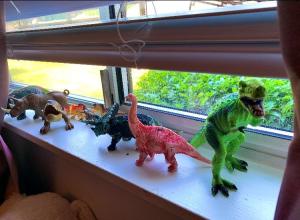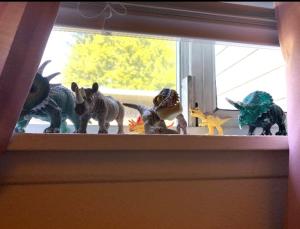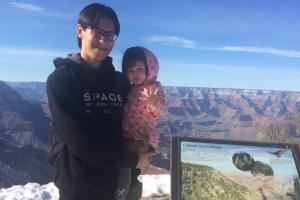
A geological era progresses ever so slowly, but can lead to dramatic and monumental change. Perhaps an analogy holds for patients who have endured traumatic brain injuries. My wife made the comparison this past week in reflecting on our son, Christopher’s TBI. Just as a geological era progresses in a miniscule manner, so, too, Christopher will not experience dramatic healing overnight or in short order, barring a miracle. Of course, it is important to highlight at the outset of this post that we are thinking only in analogical terms. A geological era extends far beyond a single human life, including a traumatically brain injured individual. I would think everyone would agree on that point.Of course, Christians debate over the history of the earth, from young earth creationists and old earth creationists to theistic evolutionists. Regardless of what your and my own views on the matter are, it is worth quoting from Carleton College’s website, which reflects upon the need for a reformation in our conception of geological time. This point has significance for dealing with traumatic brain injuries. Here’s a statement from the entry on “Geological Time.”
Geology deals with vastness of time that is far outside human experience. Our common experience of time, and our ancestors’ experiences that shaped our brain’s evolution, span intervals from a moment, to a day, to a season, to a year, to a lifetime. Geologists, in contrast, deal with thousands to millions of years, up to the 4.5 billion year age of the Earth. This vastness of time is central to geological thought, because it allows time for imperceptibly slow processes to effect monumental changes. Given enough time, erosion levels mountains. Given enough time, natural selection produces new species. Frodeman (2003) argues that understanding the brevity of human existence relative to the span of Earth history requires an “innovation in our sense of reality.”
Analogically speaking, something similar is required in our thinking about time when approaching someone with a traumatic brain injury, such as my son Christopher. The vastness of time related to the recovery of a traumatic brain injured individual is far beyond our normal experience of growth and development. It requires an “innovation in our sense of reality.” The required innovation is all the more radical given that we live in a society that fixates on instant gratification and quick fix solutions.Our medical consultant, Dr. Robert Potter (M.D., Ph.D., Fellow of the American College of Physicians), resonated with my wife’s analogical depiction of possible recovery from TBI in Christopher’s case being like a geological era. Significant or meaningful progress in Christopher’s case will occur in small, piece by piece, step by step incremental growth over a long period of time. Dr. Potter draws on decades of expertise in palliative care in providing counsel to us. The neurologist with whom Dr. Potter and we spoke said that he believes Christopher will experience meaningful recovery, but that it could take years. He did not wish to project what meaningful recovery would look like in Christopher’s situation. The prognosis and definition of meaningful recovery evolves with time, and a great amount of it.Similarly, we who have Christopher in our hearts and minds, who are at Christopher’s bedside, and who have endured this tragedy with him, are in process of development. Trauma can affect us in various ways, including slowing us down. It takes time to heal and reconfigure our sense of well-being, indeed a great deal of time, before we experience the possibility of dramatic and momentous personal growth. We are grateful for all those who have followed our journey from the beginning to this point. Of course, people are very busy and have their own lives and loved ones for whom to care. We do not deserve such thoughtful consideration. It is pure grace and compassion. Still, they understand that much of life, including traumatic ordeals, require a great amount of time to navigate. Healing of any form of significance in traumatic situations does not usually emerge in a day, a month, a year, or two. In fact, it may take a lifetime. Healing can be slow and yet dramatic over time. It is important that we are patient and take one day at a time.It is also important to account for the significance of resilience. Take for example my granddaughter. Jaylah is very resilient. I cannot comprehend how difficult it is for her to process what has happened to her daddy. Yet she is strong. Like many other children, she loves dinosaurs and has a great many dinosaur toys and stuffed animals. Like her daddy, when he was a child, she knows them all by name, and I mean all of them. Christopher longed to be a marine biologist and paleontologist when he was a boy. Perhaps Jaylah will become one someday.The dinosaurs, no matter how great, powerful, and majestic, are all gone. But we humans are here. Jaylah’s daddy is also still alive. Jaylah talks about Christopher often and holds tightly to the fact that he is still alive and the hope that he will get better. Wouldn’t it be special if Christopher could someday play and talk with Jaylah about her dinosaurs again, calling each of them by name?
Here are two pictures Jaylah’s mommy Keyonna took of some of Jaylah’s toy dinosaurs positioned in a row on her bedroom window sill. Knowing and watching Jaylah grow up, playing with her and her dinosaurs, and reading to her about them, helps me go forward one step at a time. Such cherished connections help me become resilient amid trauma so I don’t become the equivalent of a T-Rex or Velociraptor, in other words, extinct!

 We don’t know what our own family’s hopeful meaningful recovery from trauma will look like. It might take several years to discern. The progress will likely be slow, involving very small incremental growth. But the end result may be dramatic and momentous. But given our society’s fixation on immediate gratification and quick fix solutions, it will requires an “innovation in our sense of reality” to wait that long.No matter how long we have to wait, no matter how long it takes to see what meaningful recovery might look like in Christopher’s situation, no matter how old the earth is, I take to heart that the Ancient of Days is everlasting and puts everything here on earth in perspective. As much as geological time or traumatic brain injury healing time requires a transformation in our conception of temporality, eternity “deals with vastness of time that is far outside human experience.” The Scriptures put it best: “Lord, you have been our dwelling place throughout all generations. Before the mountains were born or you brought forth the whole world, from everlasting to everlasting you are God.” (Psalm 90:1-2; NIV)The Psalmist provides perspective to guard against worshiping time or allowing its apparent infinity to gain mastery and weigh us down: “A thousand years in your sight are like a day that has just gone by, or like a watch in the night.” (Psalm 90:4; NIV) The Apostle Peter also weighs in on this subject: “With the Lord a day is like a thousand years, and a thousand years are like a day.” (2 Peter 3:8; NIV) It is not ultimately time that should shape our thinking, but the Ancient of Days who teaches us to number our days so we may gain perspective and wisdom in how we approach time in all our finitude.I close with the Psalmist’s words and apply them to my family’s unfathomable journey of waiting and longing for meaningful recovery from TBI and tragedy in life. My prayer includes consideration of you in your own journey amid suffering mixed with hope. May the Lord teach all of us to number our days that we may gain a heart of wisdom. May God’s favor rest on each and every one of us and establish the work of our hands, Christopher’s too:
We don’t know what our own family’s hopeful meaningful recovery from trauma will look like. It might take several years to discern. The progress will likely be slow, involving very small incremental growth. But the end result may be dramatic and momentous. But given our society’s fixation on immediate gratification and quick fix solutions, it will requires an “innovation in our sense of reality” to wait that long.No matter how long we have to wait, no matter how long it takes to see what meaningful recovery might look like in Christopher’s situation, no matter how old the earth is, I take to heart that the Ancient of Days is everlasting and puts everything here on earth in perspective. As much as geological time or traumatic brain injury healing time requires a transformation in our conception of temporality, eternity “deals with vastness of time that is far outside human experience.” The Scriptures put it best: “Lord, you have been our dwelling place throughout all generations. Before the mountains were born or you brought forth the whole world, from everlasting to everlasting you are God.” (Psalm 90:1-2; NIV)The Psalmist provides perspective to guard against worshiping time or allowing its apparent infinity to gain mastery and weigh us down: “A thousand years in your sight are like a day that has just gone by, or like a watch in the night.” (Psalm 90:4; NIV) The Apostle Peter also weighs in on this subject: “With the Lord a day is like a thousand years, and a thousand years are like a day.” (2 Peter 3:8; NIV) It is not ultimately time that should shape our thinking, but the Ancient of Days who teaches us to number our days so we may gain perspective and wisdom in how we approach time in all our finitude.I close with the Psalmist’s words and apply them to my family’s unfathomable journey of waiting and longing for meaningful recovery from TBI and tragedy in life. My prayer includes consideration of you in your own journey amid suffering mixed with hope. May the Lord teach all of us to number our days that we may gain a heart of wisdom. May God’s favor rest on each and every one of us and establish the work of our hands, Christopher’s too:
All our days pass away under your wrath; we finish our years with a moan.Our days may come to seventy years, or eighty, if our strength endures;yet the best of them are but trouble and sorrow, for they quickly pass, and we fly away.If only we knew the power of your anger! Your wrath is as great as the fear that is your due.Teach us to number our days, that we may gain a heart of wisdom.Relent, Lord! How long will it be? Have compassion on your servants.Satisfy us in the morning with your unfailing love, that we may sing for joy and be glad all our days.Make us glad for as many days as you have afflicted us, for as many years as we have seen trouble.May your deeds be shown to your servants, your splendor to their children.May the favor of the Lord our God rest on us; establish the work of our hands for us— yes, establish the work of our hands. (Psalm 90:9-17; NIV)
PS: Here’s a picture Keyonna took of Christopher and Jaylah at the Grand Canyon, which is “a world-renowned showplace of geology.” The Grand Canyon, like human life, is all about slow but dramatic change over time. 
To read the various posts I have written while on this long journey with TBI, please go to this link. Thank you for your prayers and thoughtful care.












